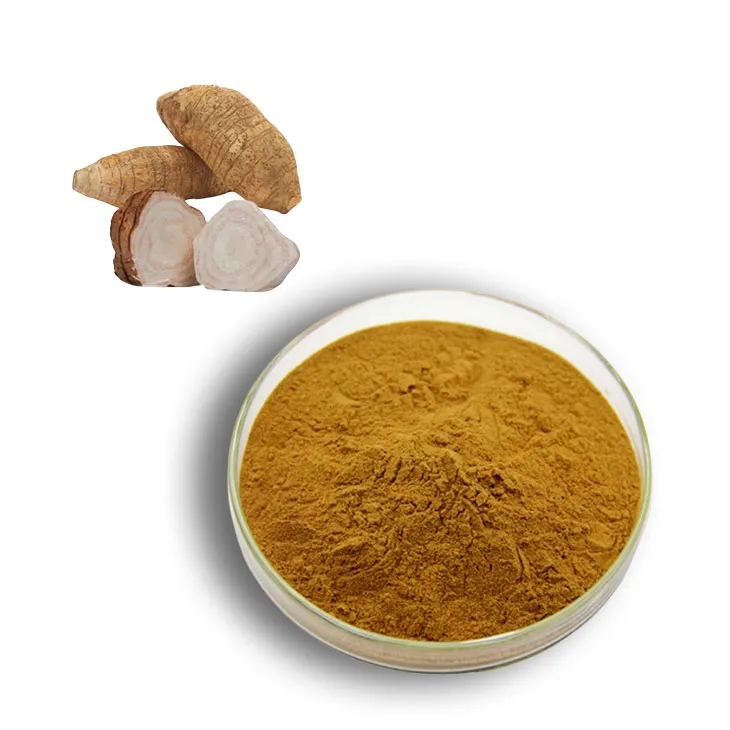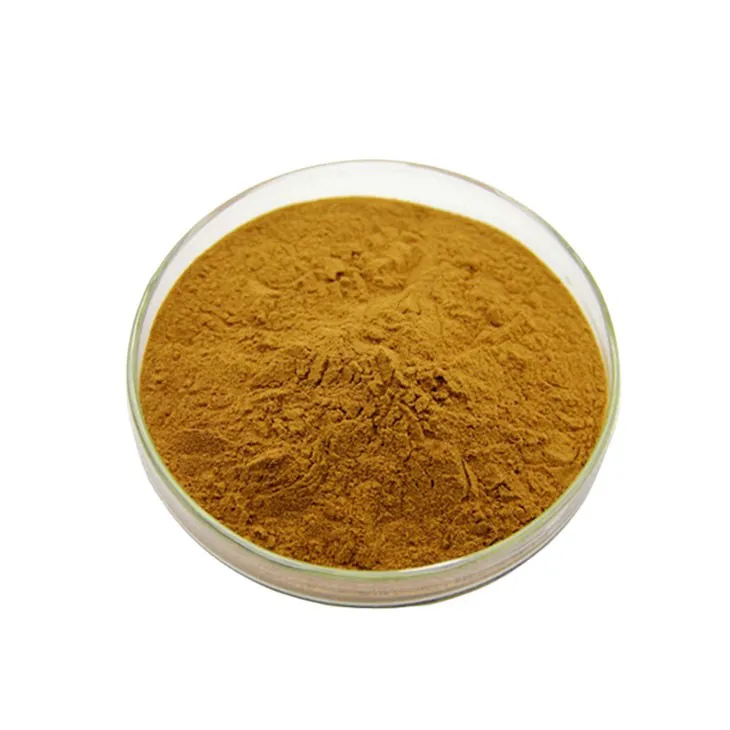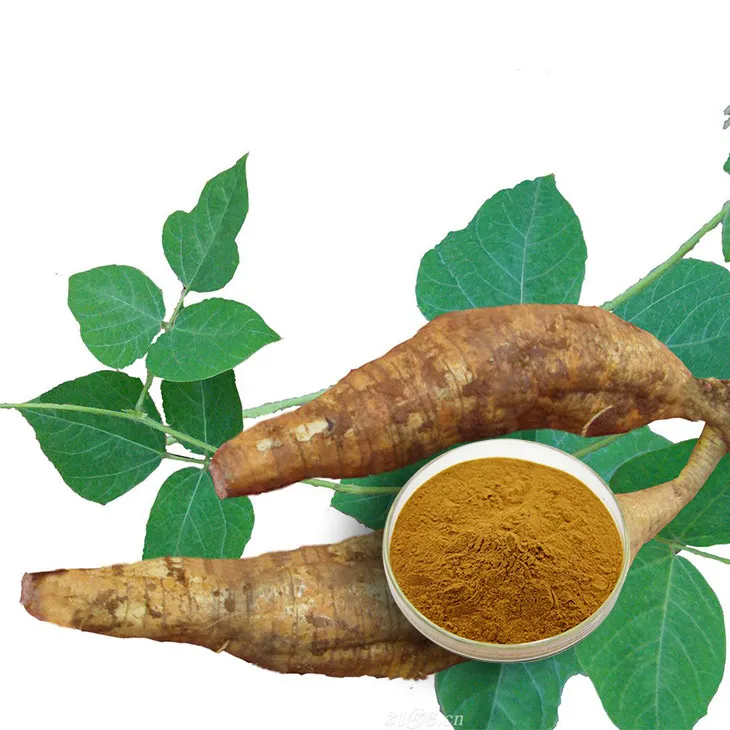- 0086-571-85302990
- sales@greenskybio.com
High - quality Pueraria lobata extract products.
2024-11-28

Introduction
High - quality Pueraria lobata extract products are a focus of much interest today. Pueraria lobata, also known as kudzu, is a plant rich in phytochemicals. These natural compounds are what make the extract so valuable in various fields. The increasing demand for natural and effective health products has led to a growing attention on high - quality Pueraria lobata extract products.

Cultivation and Quality Control
Quality control starts from the very beginning - the cultivation stage of Pueraria lobata.
Soil Management
Proper soil management is crucial. The soil needs to be well - drained and rich in nutrients. For example, a loamy soil with a good balance of organic matter, nitrogen, phosphorus, and potassium is ideal for the growth of Pueraria lobata. Farmers often conduct soil tests to determine the nutrient levels and make appropriate amendments. This may include adding compost or fertilizers to ensure the plants have enough nutrients to thrive.
Pest Control
Pest control is another important aspect. Pests can damage the plants and affect the quality of the extract. Integrated Pest Management (IPM) techniques are commonly used. This includes using natural predators, such as certain insects that feed on pests, and applying organic pesticides when necessary. For instance, neem oil can be an effective and natural pesticide to control common pests like aphids. By carefully managing pests, the quality of Pueraria lobata can be maintained at a high level.

Extraction Technologies
When it comes to extraction, a combination of traditional and modern extraction technologies is often adopted to ensure high yield and purity of the extract.
Traditional Extraction
Traditional extraction methods have been used for centuries and still hold value today. One common traditional method is maceration. In this process, the Pueraria lobata roots or other parts are soaked in a solvent, usually ethanol or water, for a certain period of time. This allows the active compounds to be dissolved into the solvent. Another traditional method is decoction, where the plant material is boiled in water. The resulting liquid contains the extracted compounds. These traditional methods are often simple and cost - effective, and they can preserve some of the traditional properties of the plant extract.
Modern Extraction
Modern extraction technologies offer more precision and efficiency. Supercritical fluid extraction (SFE) is one such technology. In SFE, a supercritical fluid, often carbon dioxide, is used as the solvent. Supercritical carbon dioxide has properties that make it an excellent solvent for extracting the active compounds from Pueraria lobata. It can operate at relatively low temperatures, which helps to preserve the thermally - sensitive compounds in the plant. Another modern method is ultrasonic - assisted extraction. Ultrasonic waves are applied during the extraction process, which can enhance the mass transfer of the active compounds from the plant material to the solvent. This results in a higher yield and a shorter extraction time. By combining traditional and modern extraction methods, manufacturers can optimize the extraction process to obtain high - quality Pueraria lobata extract.

Applications in Traditional Chinese Medicine
In traditional Chinese medicine (TCM), Pueraria lobata has been used for centuries for various ailments.
- Relieving Muscle Tension: It is often used to relieve muscle tension and pain. In TCM theory, it is believed that Pueraria lobata can promote the circulation of qi and blood in the muscles, thereby reducing muscle spasms. For example, for people with neck and shoulder pain caused by long - term sitting or improper posture, Pueraria lobata - based herbal formulas may be prescribed.
- Treating Fevers: It has been used to treat fevers. According to TCM, Pueraria lobata has a cooling effect on the body. It can help reduce fever by expelling heat from the body. In some traditional herbal prescriptions for febrile diseases, Pueraria lobata is an important ingredient.
- Alleviating Diarrhea: Pueraria lobata can also be used to alleviate diarrhea. It is thought to have astringent properties that can help regulate the function of the intestines and stop diarrhea. In TCM practice, for patients with acute or chronic diarrhea, Pueraria lobata may be part of the treatment plan.
Applications in Modern Medicine
In modern medicine, research has shown its potential in several areas.
Reducing Inflammation
One of the significant findings is its potential in reducing inflammation. Studies have shown that certain compounds in Pueraria lobata extract can inhibit the production of inflammatory mediators. For example, in vitro experiments have demonstrated that these compounds can reduce the release of cytokines such as interleukin - 6 and tumor necrosis factor - alpha, which are key players in the inflammatory response. This anti - inflammatory property makes Pueraria lobata extract potentially useful in treating inflammatory diseases such as arthritis.
Cardiovascular Health
There is also evidence suggesting its benefits for cardiovascular health. Some components in the extract may help to lower blood pressure. For instance, it has been found that certain flavonoids in Pueraria lobata can relax blood vessels, leading to a reduction in blood pressure. Additionally, it may have a role in improving lipid metabolism. Studies have indicated that it can help reduce levels of bad cholesterol (LDL - cholesterol) and increase levels of good cholesterol (HDL - cholesterol), thus potentially reducing the risk of cardiovascular diseases.
Applications in the Wellness Industry
In the wellness industry, Pueraria lobata extract is made into various forms such as capsules and powders for people to easily incorporate into their daily health regimens.
Promoting Liver Health
It shows promise in promoting liver health. The liver is a vital organ responsible for many functions in the body, including detoxification. Some studies suggest that Pueraria lobata extract can help protect the liver from damage caused by toxins such as alcohol and certain drugs. It may enhance the liver's antioxidant defense system, reducing oxidative stress on the liver cells. For people who are concerned about liver health, taking Pueraria lobata extract in the form of capsules or powders can be a preventive measure.
Improving Digestion
Pueraria lobata extract can also improve digestion. It can stimulate the secretion of digestive enzymes, which helps break down food more efficiently. For those with digestive problems such as indigestion or bloating, consuming Pueraria lobata - based products may provide relief. In addition, it can also help regulate the gut microbiota. A healthy gut microbiota is essential for overall health, and Pueraria lobata extract may contribute to maintaining a balanced gut environment.
Conclusion
High - quality Pueraria lobata extract products have a wide range of applications and potential benefits. From traditional Chinese medicine to modern medicine and the wellness industry, the value of Pueraria lobata extract is being increasingly recognized. However, further research is still needed to fully explore its mechanisms of action and to develop more effective and safe products. With continued research and development, Pueraria lobata extract is likely to play an even more important role in promoting human health in the future.
FAQ:
What are the main phytochemicals in Pueraria lobata?
Pueraria lobata contains various phytochemicals, such as isoflavones. These compounds are important for its potential health benefits, including antioxidant and anti - inflammatory properties.
How is the quality of Pueraria Lobata Extract controlled during cultivation?
During the cultivation of Pueraria lobata for extract production, quality control involves proper soil management to ensure the plant gets the right nutrients. Pest control is also crucial to prevent damage to the plant. These measures help to produce high - quality raw materials for extraction.
What are the advantages of combining traditional and modern extraction technologies for Pueraria Lobata Extract?
The combination of traditional and modern extraction technologies for Pueraria Lobata Extract offers several advantages. Traditional methods may preserve some of the plant's natural properties, while modern technologies can ensure a high yield and high purity of the extract. This combination helps to produce a more effective and consistent product.
What are the different forms of high - quality Pueraria lobata extract products?
High - quality Pueraria lobata extract products come in various forms. They can be made into capsules for easy consumption, powders that can be added to drinks or food, and sometimes even in liquid form for those who prefer it. These different forms make it convenient for people to incorporate into their daily health regimens.
How does Pueraria lobata extract promote liver health?
Research suggests that Pueraria lobata extract may promote liver health through its anti - inflammatory and antioxidant properties. It may help to reduce oxidative stress in the liver and protect liver cells from damage. However, more research is still needed to fully understand the mechanisms.
Related literature
- Pueraria lobata: A Review of Its Phytochemistry and Pharmacological Activities"
- "The Quality Control of Pueraria lobata Extract in Modern Medicine"
- "Traditional and Modern Extraction Technologies for Pueraria lobata: A Comparative Study"
- ▶ Hesperidin
- ▶ citrus bioflavonoids
- ▶ plant extract
- ▶ lycopene
- ▶ Diosmin
- ▶ Grape seed extract
- ▶ Sea buckthorn Juice Powder
- ▶ Beetroot powder
- ▶ Hops Extract
- ▶ Artichoke Extract
- ▶ Reishi mushroom extract
- ▶ Astaxanthin
- ▶ Green Tea Extract
- ▶ Curcumin Extract
- ▶ Horse Chestnut Extract
- ▶ Other Problems
- ▶ Boswellia Serrata Extract
- ▶ Resveratrol Extract
- ▶ Marigold Extract
- ▶ Grape Leaf Extract
- ▶ blog3
- ▶ blog4
-
Active components in dandelion leaf extract.
2024-11-28
-
Chinese Rose Hip Extract Factories.
2024-11-28
-
Supplier of Hedyotis diffusa extract.
2024-11-28
-
Standard - process stevia extract.
2024-11-28
-
Hops Extract
2024-11-28
-
Curcumin
2024-11-28
-
Calendula Extract
2024-11-28
-
Hawthorn powder
2024-11-28
-
Marigold Extract
2024-11-28
-
Horse Chestnut Extract
2024-11-28
-
Grape Leaf Extract
2024-11-28
-
Uridine-5'-monophosphate Disodium salt
2024-11-28
-
Yam Extract
2024-11-28
-
Genistein
2024-11-28





















